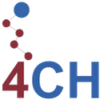The 4CH Kick-off meeting was held on the 9th February by Zoom and hosted by Francesco Taccetti of INFN, the Project Co-ordinator. There were quite a few presentations with a peak attendance of 104 participants which is a great start. The meeting began with introductions by the Co-ordinator, Prof. Diego Bettoni (INFN Vice President, in charge of technology transfer), Rehana Schwinninger-Ladak, (DG CNECT, Head of Unit ‘Interactive Technologies, Digital for Culture & Education’) and Fulgencio Sanmartín (DG CNECT, Project Officer). Rehana’s presentation highlighted the value of Cultural Heritage (CH) to Europe which supports 8.7m jobs with a value of EUR 128m, 5.3% of EU GDP. But only 10% of this CH is digitised and accessible online and there is insufficient use of digital technology by the sector. Consequently, the 2011 recommendations have been updated and include, among others, advancing digital skills, making full use of digital data and improving online access – all issues that 4CH has to address.
Next, Fulgencio talked about Europeana, this being one of DG CNECT’s main responsibilities, with a network of 3,300+ CH Institutions and 38 trusted Aggregators. As of now, there are 50m+ objects and 2.8bn LOD items in the Europeana Data Model (EDM). Other activities mentioned was the recent call for Museum Collaboration (with a focus on small museums), another for Basic Principles for 3D, a study on the quality of 3D digitisation, and eArchiving which is concerned with preserving data and devices for 20 years hence. He advised 4CH not to underestimate this last item and to look at the reports. After going over the objectives of the project and outlining the Commission’s expectations for training, guides and success stories, he also emphasised that he wished to work closely with 4CH as the EU has great expectations for the project outcomes. He then went on to cover the Workplan and hoped that first Project Review in July 2023 in Luxembourg would be in person. Finally, he suggested that the project create some events by December (compatible with the COVID-19 issues), concluding that the Commission would help with events and communications. The next two presentations by Francesco Taccetti and Roberto di Giulio went over the objectives and challenges as to be found in the 4CH Description of Work.
Following the break, Franco Niccolucci (PIN) gave a presentation on ‘Implementing the 4CH Vision’ with some excellent examples of how 4CH technology and methods can be applied to CH sites and objects in a variety of contexts such as for mitigating the effects of disasters and valorising heritage assets. This has been made available on the website as it encapsulates many of the issues that CH faces whilst also illustrating the benefits and opportunities. Paola Ronzino (PIN) followed with a Project Management overview. 4CH is using Basecamp for internal communication where partners will find messaging that can be sent to specific groups (e.g. Tasks) and text documents with URLs to administrative documents. Google Drive is being used to archive the project documents. The last presentation before lunch was given by Isabel Rodriguez-Maribona of TECHNALIA on Fostering innovation in project activities. Isabel talked about the importance of innovation which is harnessing creativity with successful commercialisation. 4CH must offer an attractive portfolio of services etc. to succeed and its output will cover 3D, Heritage Science and knowledge management, data treatment, history, art & architecture, story-telling and policies.
After the lunch break, the 19 partners each had 5 minutes to present their organisations, their role in the project and who would be participating. Each partner has a profile on the website (https://www.4ch-project.eu/
